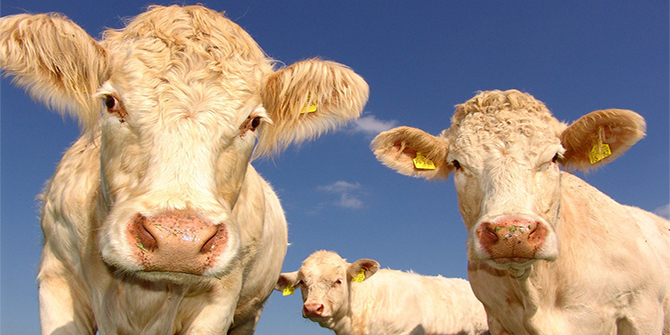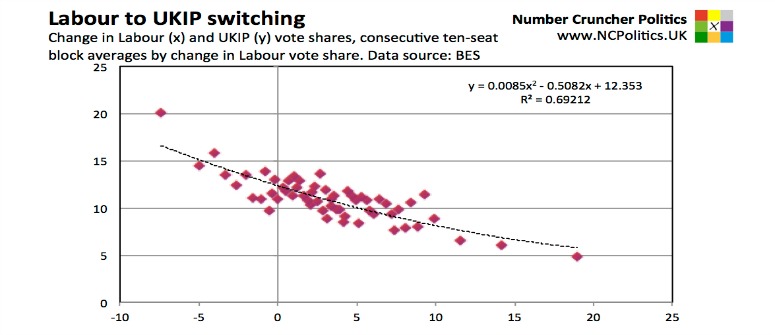 The Co-operative Party, institutionally linked to Labour, is the third largest party in the House of Commons. But does it influence public policy? Sean Kippin uses the case of Supporters Direct – an organisation created by the New Labour government in 1998 – to argue that it did so in this case by acting more like a ‘think tank’ than a political party, and that this marked the beginning of the party’s return to relevance.
The Co-operative Party, institutionally linked to Labour, is the third largest party in the House of Commons. But does it influence public policy? Sean Kippin uses the case of Supporters Direct – an organisation created by the New Labour government in 1998 – to argue that it did so in this case by acting more like a ‘think tank’ than a political party, and that this marked the beginning of the party’s return to relevance.
Despite the claims of the SNP and the Liberal Democrats, Britain’s third party – at least in terms of seats in the House of Commons – is the Co-operative Party. Since 1917, it has been in an unusual electoral partnership with Labour, with a number of the latter’s MPs serving as ‘dual nationality’ Labour and Co-operative MPs. In practice, the arrangement allows the Co-operative Party – who retain a direct institutional link to the wider cooperative movement of member-owned businesses – a degree of input and visibility in the political realm.
During the long years of Labour opposition (1979-1997), the Co-operative Party experienced a difficult period, with the cooperative and member-owned sector (particularly in finance) struggling economically, organisationally, and politically. In the early 1990s it experienced leadership problems, and in a broader sense struggled to define a role for itself in the ‘Project’ of New Labour. From 1997 onwards, the Co-operative Party sought to remedy this through the enaction of the “New Mutualism” project which sought to expressly link those cooperative values and principles to Third Way politics, mimick its language, and more overtly orientat itself towards policy development. This approach harvested some early fruit in the form of the creation of the organisation Supporters Direct.
Supporters Direct seeks to support football fans in influencing and potentially owning their football clubs. In its nearly 20 years in existence, it has become a fixture of the professional football world, helping to organise football fans into supporters’ trusts. Its origin was in a pamphlet authored by Jonathan Michie, who made the case for mutual (specifically fan) ownership of football clubs, and suggested a means by which this could be realistically achieved: the formation of football supporters trusts. Crucially, it came at a time in which the Labour government was paying attention to football’s social and cultural facets, as evidenced through the Football Taskforce, which had been asked to make recommendations about the future of the sport. One of its key participants had been a young Andy Burnham (today, the Mayor of the Greater Manchester Combined Authority).
Burnham, a football fan, had since the publication of the report been hired as a Government Special Adviser to the Secretary of State for Media, Culture, and Sport, Chris Smith. Following some machinations, Smith announced the creation of Supporters Direct to the Labour Party conference in Bournemouth in 1999. The organisation was to assist and advise in the formation and activities of Supporters Trusts, and would go on to help facilitate the takeover of several clubs by groups of fans. Although it has never quite achieved what its most idealistic advocates would hope – the creation of a fan owned Premier League superpower in the mould of FC Barcelona – it has nonetheless increased the voice and influence of organised football fans. While the Co-operative Party would go on to influence government policy in a more high-profile way (most notably through its influence in helping to design NHS Foundation Trusts and Hospitals, and Co-operative Schools), this nonetheless represents the success of the party in influencing government policy.
My recent article in British Politics seeks to use the Multiple Streams Approach to break-down the features of this influence. Drawing on elite stakeholder interviews and secondary sources, it argues that the Co-operative Party and associated ‘policy entrepreneurs’ used the opportunity of the publication of the Football Taskforce report to present a solution of sorts to the problem of the perceived ‘over-commercialisation’ of the professional game in the nascent Premier League era. It further argues that this overt linkage of its own aims to that of New Labour through the New Mutualism project allowed its policy agenda to be seen in a new light, rather than something imposed outwith that of the Labour Party leadership. It also did so at a time in which captured – to the extent that this was necessary given the relatively small scale of the change – the national mood, which had become influenced by news stories relating to the excesses of footballers’ wages and iniquitous behaviour by the ownership of certain clubs.
The most interesting element of this case study is the way in which policy change was achieved. Despite having 30 or so MPs, change was achieved through the direct engagement of (non Co-op) Government ministers through what can be described as a ‘think tank’ (and particularly ‘advocacy tank’) style of influence: hosting events, recruiting sympathetic and influential ministers, and generally acting as a bridge between ideas, policy, and decisionmakers. Indeed, this is perhaps symptomatic of a broader shift towards think tanks as sites of policy influence, which occurred concurrently with the sidelining of the traditional organs of the Labour Party, such as conference and the unions. Undoubtedly, this shift placed the Co-operative Party at an organisational disadvantage, despite its institutional separateness.
Ultimately, the Co-operative Party would go on to play a modest but notable role in the public policy output of the Labour government, with its role in packaging the set of ideas known as ‘mutualism’. Beyond this, its practical role in placing the cooperative structure into secondary education (with 900 Co-operative Schools) now in operation across England, and the membership elements of NHS Foundation Trusts and Hospitals, also left a mark on public policy. Supporters Direct represented the first step on this journey, with the party showing that it was capable of creating credible policy initiatives that appealed to key decisionmakers within government.
Today, the Co-operative Party is enjoying one of its strongest periods to date. With a left-wing Labour leadership looking like credible contenders for power, the shift towards a new institutional politics of public ownership and aggressive market intervention may see the likewise return to its roots of advocating, straightforwardly, for cooperatives as a bulwark against exploitative capitalism. Crucially, John McDonnell and Jeremy Corbyn seem receptive to such a role for the party and for the institutional form they represent. Again, this shows that the Co-operative Party has become capable of placing itself within Labour’s dominant ideological paradigm and presenting a version of its idea that fits the current zeitgeist. Supporters Direct was, in some ways, the beginning of the Co-op Party’s return to relevance. If, and when, Labour return to power, it will be worth keeping an eye on.
_____________
Note: the above draws on the author’s published work in British Politics.
 Sean Kippin is a Doctoral Candidate at the University of the West of Scotland and Visiting Lecturer in Politics at the University of Stirling.
Sean Kippin is a Doctoral Candidate at the University of the West of Scotland and Visiting Lecturer in Politics at the University of Stirling.
All articles posted on this blog give the views of the author(s), and not the position of LSE British Politics and Policy, nor of the London School of Economics and Political Science. Featured image credit: Pixabay (Public Domain).








I welcome any constructive contribution from the Co-operative Party on the current policy debate.
However, whether you call it mutual ownership or worker co-operative, the significance seems rather over-stated. Such things are and always have been marginal in the UK and there is nothing to suggest that is going to change. As a “challenge” to capitalism(or any other “ism”) they are not credible.
I will let others judge whether a Corbyn-lead Labour Party is, as the author seems to think, a credible government in waiting. The inability to secure a poll lead of any significance despite the current Government’s travails and the recent defection of some Labour MPs suggests not, but who knows?